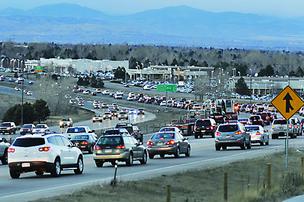Colorado’s Budget Settled, Debate Coming On Taxes, Refunds « CBS Denver .

Speaker Dickey Lee Hullinghorst and other Democrats, including Gov. John Hickenlooper, want the fee set aside to avoid refunds under the Taxpayer’s Bill of Rights, free millions of dollars for Colorado’s underfunded roads and schools, and give momentum to pending ballot initiatives that would ease TABOR’s grip on state finances.
It’s a debate that some thought settled well before both chambers approved the $27 billion budget last week. Not so, said Hullinghorst, a Boulder Democrat.
“In this budget we managed to get by, but next year it will be twice as bad with cuts in education and higher education,” she said. The House could debate her bill this week.
Hullinghorst said reclassifying the fee can provide at least five years’ flexibility to spend more on schools and roads, and tackle TABOR and other constitutional restrictions on budget writers’ room to maneuver.
TABOR requires refunds whenever total state income surpasses a cap that’s based on inflation and population, not the economy’s performance.







